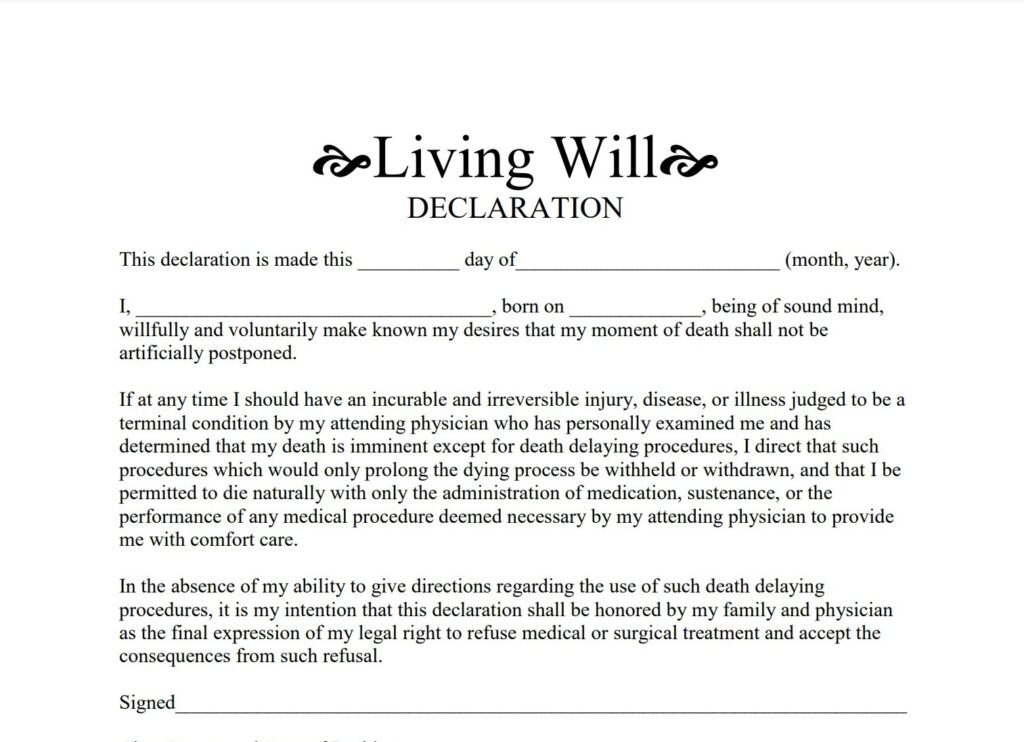
A living will is a legal document you create yourself that tells your doctors the type of medical care you’d want in a future scenario where you A) have some sort of incurable, terminal illness and B) you can’t tell the doctors in real time what you want them to do or not do to you. Its intentions are 3-fold:
- Preserve your autonomy by giving you means to control your healthcare even if you can’t speak for yourself
- Unburden your loved ones with a written document so they don’t have to guess the type of care you want down the road
- Provide you peace of mind by having a clear plan for the future in place
That sounds kind of handy, right?
Ehhh…
To be honest, I can’t think of the last time a living will meaningfully changed how the doctors took care of someone.
How can that be?
Let me answer that with this hypothetical (but not implausible) scenario:
A man in his early 60s gets diagnosed with stage 4 (metastatic) lung cancer. His oncologist tells him his life expectancy is likely 1 to 2 years. Hearing this news, he jumps to getting his affairs in order, including creating a living will. Making a living will is important to him because he is certain that when he gets to the end of his life, he would never want to prolong his life on a ventilator.
Fast forward 2 years, and this man has been slowing down but doing ok with the cancer treatment. Suddenly, he gets a serious pneumonia that’s made him septic and put him into respiratory failure. He’s rushed to the hospital and the doctors know that if they don’t intubate him and put him on a ventilator, he could die within the hour. Meanwhile, the doctors have called this man’s family – family that he keeps in regular touch with and is very close to. His family is rushing to get to the hospital but they live all over the country and could take up to 2 days to arrive. There is no way that they could make it before this man dies – unless the doctors use the ventilator to keep him alive.
The man is too sick to tell the doctors what to do, but he has a living will. The question is: does this living will, which says to NOT put him on a ventilator, actually reflect what he would say in this exact situation? Is his dying without machines more important than dying with his family at his side?
Of course, it’s impossible to know for sure what this man would say. And that’s precisely the problem with living wills. Their scope is just too limited to really be helpful in real life. As this scenario illustrates, it’s next to impossible to predict exactly when and how illness will change the course of your life – and it’s equally impossible to predict ahead of time exactly what you’ll want the doctors to do in your specific situation.
How then do you make plans for your future?
There are two other options I offer to patients:
- Durable Power of Attorney for Healthcare (HCPOA). This is an advance directive where you legally name someone to be your backup medical decision maker in case you can’t make your own decisions. Ideally you pick someone who knows you and what’s most important to you, and that you ultimately trust to make thoughtful decisions about your care. I think it’s almost always a good idea to have one of these in place, but it is especially important if the person you’d want making your decisions is NOT who would be given that power by default (check your state’s individual law for more details on this).
- Practitioner Order for Life Sustaining Treatment (POLST). This is a portable medical order signed by a provider that allows you to make it clear that under no circumstances would you wish to undergo resuscitative efforts. This is helpful for folks worried about paramedics resuscitating them against their will in an emergency where they can’t state their own preferences. Keep in mind that because this is a real medical order, it is rigid and does not take context into account – like the living will). But if this sounds like something you might be interested in setting up, talk to your doctor about it.
Hope you found this helpful. Thanks for all your hard work you do!